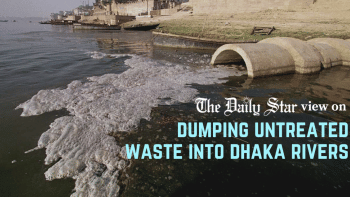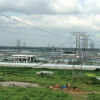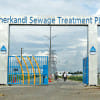Dhaka needs a better waste management system

We are pleased that the Dasherkandi Sewage Treatment Plant was finally opened after the PM inaugurated it on Thursday. Being the largest such plant in South Asia, it has the capacity to treat 20-25 percent of the 2,000 million litres of sewage generated in Dhaka city daily. The issue of untreated sewage polluting our rivers and other water sources has long been a problem for Dhaka. Given its lack of a proper waste management system, the newly launched STP in Aftabnagar comes with the hope that the city will start to become more liveable going forward. However, some concerns about the extent of its effectiveness remain.
Although the plant is supposed to treat sewage coming from a number of areas – including Tejgaon, Badda, Banani, Gulshan (in part), Ramna, Mouchak, Hatirjheel, and Dhanmondi (in part) – it currently has only a 5km trunk sewer line connecting Rampura. Experts and even officials have, in the past, raised concerns about the additional years and funds that would be needed to create the remaining networks. Meanwhile, the existing Pagla sewage treatment plant, which treats around 10 percent of Dhaka's waste, is being renovated. Additionally, many of the drains in the capital are also broken or clogged. All this suggests that there is still a lot that needs to be done to save our rivers and canals from being contaminated with waste every day.
In this connection, one may also recall how poorly the central effluent treatment plant (CETP) project at the Savar Tannery Industrial Estate has gone. As a recent report by this daily revealed, the contractor that built that facility handed over an incomplete CETP. We sincerely hope that the Dasherkandi STP will fare better than its counterparts. If successfully run, this plant – part of Wasa's master plan to construct five STPs to treat 100 percent of the sewage generated in Dhaka – can save the city's water bodies from the incessant pollution and contamination. We, therefore, urge the relevant authorities, especially Dhaka Wasa, to ensure that all areas are properly connected to the sewage treatment plants.


 For all latest news, follow The Daily Star's Google News channel.
For all latest news, follow The Daily Star's Google News channel. 









Comments